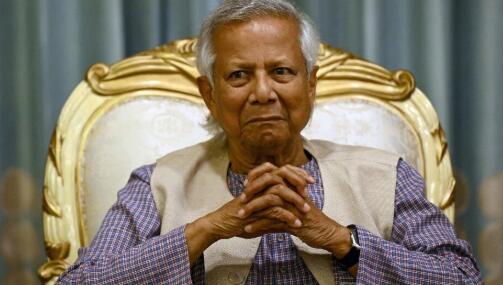Once celebrated globally as the “banker to the poor,” Muhammad Yunus has now revealed his true political face not as a savior of the oppressed, but as a power-hungry opportunist openly playing into the hands of China and Islamist factions, all while undermining India’s strategic interests. Muhammad Yunus, now at the helm of Bangladesh’s interim regime, is increasingly enabling and emboldening anti-India rhetoric, the latest proof being a vile social media post by Maj Gen (retired) ALM Fazlur Rahman, a key appointee in his administration. Fazlur Rahman, a known sympathizer of Islamist causes, suggested that Bangladesh and China should jointly occupy India’s northeastern states if India retaliates against Pakistan over the April 22 Pahalgam massacre, a horrific Islamist attack that killed 26 Indian civilians with majority being Hindus.
That such dangerous language comes from the head of a government-appointed commission handpicked by Muhammad Yunus himself is no coincidence. It reflects a toxic undercurrent of anti-India sentiment that is steadily seeping into Bangladesh’s corridors of power under Yunus’s watch. The regime’s half-hearted attempts to distance itself from Rahman’s comments fool no one. The pattern is clear: cloak radicalism in the garb of “student movements,” whitewash Islamist incitement as “civil dissent,” and let ex-military men peddle Chinese strategic talking points. Let’s not forget: Muhammad Yunus’s rise to interim power came after the ouster of Sheikh Hasina, India’s strongest democratic ally in the region and a bulwark against Islamist militancy. In contrast, Muhammd Yunus has remained disturbingly silent on the resurgence of Islamism.
And now, Muhammd Yunus has added another layer to his betrayal economic and strategic kowtowing to China. During his recent Beijing visit, Yunus described Bangladesh as the “only oceanic guardian” in the region and pitched it as a logistical springboard for Chinese expansion into India’s northeast, Nepal, and Bhutan. While pretending to play the diplomat, he is in reality handing China the strategic keys to South Asia, hoping to turn Bangladesh into a client state in Beijing’s debt trap diplomacy. India cannot afford to ignore the writing on the wall. Under Muhammad Yunus, Bangladesh is fast becoming a tool in the hands of anti-India forces, both Islamic hardliners at home and Chinese expansionists abroad. His silence on extremist resurgence, his indirect legitimization of anti-Hindu rhetoric, and his willingness to play host to China’s South Asian ambitions are not diplomatic missteps they are deliberate choices.
























